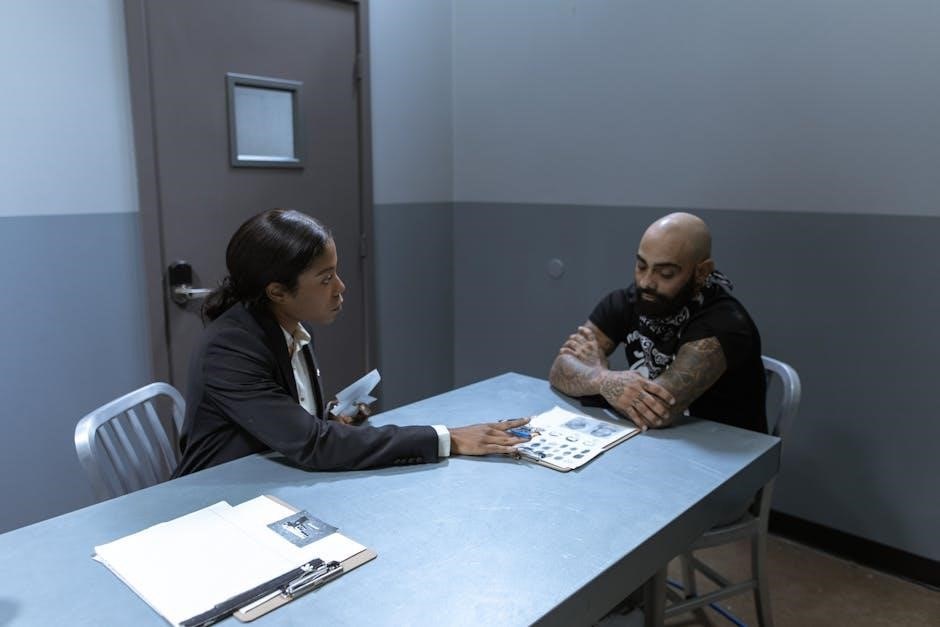
Discover essential chef interview questions and answers in PDF guides, offering structured approaches, sample responses, and expert tips to help you excel in your culinary career.
Overview of the Importance of Chef Interviews
Chef interviews are pivotal in assessing culinary skills, creativity, and leadership. They evaluate a candidate’s passion, experience, and strategic thinking, ensuring alignment with the restaurant’s vision. Employers use these interviews to gauge a chef’s ability to manage kitchens, innovate menus, and maintain quality. For candidates, they offer a platform to showcase expertise and career ambitions, making preparation crucial for success.
Why Preparation is Key to Success
Preparation is vital for acing chef interviews, as it showcases professionalism and readiness. Understanding common questions, practicing responses, and reviewing resources like PDF guides ensure confidence. Familiarity with techniques, menu planning, and behavioral queries helps candidates stand out. Preparation demonstrates dedication and elevates the ability to articulate culinary expertise, leadership, and career goals effectively during the interview process.
General Chef Interview Questions
Explore common chef interview questions covering culinary background, inspiration, ambitions, and specific skills, helping candidates prepare for a wide range of inquiries in their interviews.
Tell Me About Yourself and Your Culinary Background
This question allows candidates to showcase their passion, experience, and growth in the culinary field. Highlight your journey, key skills, and what drives your creativity in cooking. Emphasize your professional background, certifications, and how your experiences have shaped your culinary style. Be concise, yet impactful, demonstrating how your story aligns with the restaurant’s values. Refer to PDF guides for sample answers and tips;
What Inspired You to Become a Chef?
Share your personal journey, highlighting what sparked your passion for cooking. Discuss influential experiences, mentors, or family traditions that shaped your culinary interest. Emphasize how creativity, flavor exploration, and the joy of nourishing others inspired your career choice. Be genuine and concise, showcasing your dedication and growth in the culinary arts. Refer to PDF guides for crafting compelling responses.
What Are Your Ambitions as a Chef?
Express your long-term goals, such as advancing to leadership roles, exploring culinary creativity, or specializing in a cuisine. Highlight ambitions like menu innovation, sustainability efforts, or mentoring future chefs. Align your aspirations with the restaurant’s vision, emphasizing how your growth contributes to the team and culinary excellence. Showcase passion for continuous learning and industry evolution.
Role-Specific Chef Interview Questions
Explore tailored questions for sous chefs, executive chefs, and private chefs, focusing on responsibilities, leadership, and culinary expertise to match specific kitchen roles and expectations.
Questions for Sous Chef Positions
Sous chef interview questions focus on kitchen management, team coordination, and problem-solving. Examples include handling ingredient shortages, managing high-pressure situations, and ensuring consistent dish quality. These questions assess leadership, adaptability, and attention to detail, essential for a sous chef role. Preparation is key to demonstrating your ability to support the executive chef and maintain kitchen efficiency effectively.
Executive Chef Interview Questions
Executive chef interviews focus on leadership, culinary vision, and operational expertise. Questions may include managing kitchen staff, developing menus, and controlling costs. They also assess strategic thinking, such as implementing new culinary trends or handling kitchen crises. Behavioral questions using the STAR method are common, ensuring candidates demonstrate both creativity and managerial prowess effectively in high-pressure environments.
Private vs. Personal Chef: Understanding the Differences
Private and personal chefs differ in employment structure and responsibilities. A private chef is employed full-time by one individual or family, often living in and preparing up to three meals daily. In contrast, a personal chef serves multiple clients, typically one per day, designing custom meals for each. Understanding these distinctions is key for tailored interview preparation.
Behavioral Chef Interview Questions
Behavioral questions assess your problem-solving skills and past experiences. Use the STAR method to structure your answers, detailing situations, tasks, actions, and results effectively.
Using the STAR Method to Answer Behavioral Questions
The STAR method (Situation, Task, Action, Result) helps structure answers to behavioral questions. Describe the situation, outline your task, explain your actions, and highlight the outcome. This approach ensures clarity and demonstrates your problem-solving skills and decision-making. It’s particularly effective for chef interviews, where showcasing leadership and teamwork is crucial. Use it to narrate challenging kitchen scenarios and your role in resolving them.
Describe a Challenging Dish You Prepared and How You Ensured Its Success
One challenging dish I prepared was a complex seven-course tasting menu for a high-profile client. I ensured its success by meticulously planning each component, sourcing the freshest ingredients, and maintaining precise timing. My attention to detail, creativity, and teamwork ensured a cohesive and exceptional dining experience, earning rave reviews and showcasing my culinary expertise.
Managing High-Pressure Situations in the Kitchen
In high-pressure situations, I prioritize tasks, maintain a calm demeanor, and ensure clear communication. During a busy service, if a key team member was absent, I delegated tasks efficiently, focused on plating accuracy, and motivated the team to maintain quality and timing, resulting in a smooth and successful service despite the chaos.
Tips for Acing a Chef Interview
Showcase your passion, professionalism, and strategic thinking. Highlight creativity, leadership, and problem-solving skills. Use the STAR method for behavioral questions and emphasize your culinary expertise confidently.
How to Showcase Your Passion and Creativity
To showcase passion, share personal culinary journey stories and dishes that inspire you. Highlight creativity by discussing unique recipes or menu ideas; Emphasize how your innovative approaches enhance kitchen efficiency and diner experiences, demonstrating your artistic and technical skills effectively during the interview; This helps employers envision your contribution to their culinary team and success.
Highlighting Leadership and Team Management Skills
Emphasize your ability to lead by example, delegate tasks effectively, and maintain kitchen harmony. Share examples of how you motivated your team, resolved conflicts, and ensured consistency in high-pressure environments. Highlight organizational skills, clear communication, and adaptability. Showcase how your leadership fosters collaboration and drives success, ensuring both team growth and exceptional dining experiences for customers.
Handling Tough Interview Scenarios
Be prepared to address difficult questions about weaknesses or past conflicts. Use the STAR method to structure your responses, focusing on resolution and growth opportunities.
How to Answer Questions About Your Weaknesses
When discussing weaknesses, frame them positively by showcasing self-awareness and growth. For example, mention a past challenge like time management or delegation, then explain how you’ve improved. Use the STAR method to structure your response, emphasizing lessons learned and actions taken to overcome the weakness. This demonstrates maturity and a commitment to professional development.
Why Do You Want to Work for This Restaurant?
Express genuine enthusiasm by highlighting the restaurant’s reputation, menu style, or culinary philosophy that resonates with your passion. Mention specific aspects, such as their use of local ingredients or innovative techniques, and explain how your skills and values align with their mission. This demonstrates research and a sincere interest in contributing to their success.

Menu Development and Culinary Creativity
Explore how chefs approach menu planning, balancing creativity with practicality, and align dishes with restaurant goals, ensuring seasonal and dietary considerations are seamlessly integrated.
How Do You Approach Menu Planning and Development?
My approach to menu planning and development begins with understanding the restaurant’s culinary vision and target audience. I focus on seasonal ingredients, balancing creativity with practicality, and ensuring dishes align with dietary trends and preferences. Collaboration with the kitchen team is key to refining ideas, while maintaining consistency and innovation in the final menu offerings.
What Cuisine Do You Most Enjoy Working With and Why?
I am most passionate about working with Italian cuisine due to its rich flavors and versatility. From pasta dishes to wood-fired pizzas, each recipe tells a story and allows for creativity. The emphasis on quality ingredients and traditional techniques aligns with my culinary philosophy, making every dish a delightful experience to prepare and share.

Negotiation and Next Steps
Discussing salary, benefits, and expectations is crucial. Ensure alignment on compensation and growth opportunities, while understanding the next steps post-interview for a smooth transition.
How to Discuss Salary and Benefits
When discussing salary and benefits, research industry standards to ensure your expectations are realistic. Be confident yet humble, clearly stating your worth without appearing arrogant. Transparently communicate your financial and career expectations, ensuring alignment with the restaurant’s compensation structure. Highlight your skills and experience to justify your request, and inquire about additional perks like health insurance or culinary training opportunities.
What to Expect After the Interview
After your chef interview, expect a follow-up period where the employer evaluates candidates. Send a thank-you email within 24 hours to express gratitude and reiterate your interest. Allow 1-2 weeks for feedback, though timelines may vary. Be prepared for reference checks or a second interview. Stay professional and patient, ensuring you’re ready to discuss start dates and contract details if offered the position.

Common Mistakes to Avoid in Chef Interviews
Overconfidence, lack of preparation, and failure to research the restaurant are common pitfalls. Avoid discussing weaknesses vaguely and ensure professionalism, as these mistakes can hinder your success.
Overconfidence vs. Humility: Striking the Right Balance
While confidence is crucial, overconfidence can appear as arrogance. Showcase humility by acknowledging teamwork and past learnings. Balance self-assurance with modesty, demonstrating passion without entitlement. Highlight skills naturally, avoiding exaggerated claims. This approach builds trust and professionalism, essential for a positive impression in chef interviews, as emphasized in top PDF guides like Richard McMunn’s comprehensive resource.
Not Preparing for Common Questions
Failing to prepare for common chef interview questions can lead to missed opportunities. Researching typical queries, such as strengths, weaknesses, and career ambitions, ensures confidence. Use PDF guides to review answers and practice articulating experiences. Lack of preparation may signal poor foresight, harming your professional image and chances of success in a competitive culinary job market.
Chef Interview Questions and Answers PDF Guides
Download comprehensive PDF guides offering top chef interview questions, structured answers, and expert tips. These resources provide insights into common queries, helping you prepare effectively for culinary interviews.
Top 21 Chef Interview Questions and Answers
Access a curated list of the top 21 chef interview questions and answers in PDF format. This guide provides structured responses, covering topics like culinary background, challenges, and ambitions. It includes questions such as “Tell me about yourself and your culinary journey” and “What inspired you to become a chef?” to help you prepare confidently for your interview.
Downloading Comprehensive PDF Resources
Download comprehensive PDF guides featuring top chef interview questions and answers. These resources offer detailed insights, structured responses, and expert advice. Access guides like Richard McMunn’s Top 21 Chef Interview Questions and Answers, complete with sample responses and tips. These PDFs provide convenient preparation, ensuring you’re well-equipped to excel in your culinary interview. Instant downloads available for easy access.
Summarizing Key Takeaways
Key takeaways include understanding common questions, using the STAR method for behavioral answers, and showcasing passion and skills. PDF guides offer structured preparation, sample answers, and expert tips to enhance your confidence and professionalism during chef interviews, ensuring you stand out in a competitive culinary job market.
Encouragement to Practice and Prepare
Thorough preparation is key to acing a chef interview. Practice answering common questions, master the STAR method for behavioral queries, and review sample answers in PDF guides. Focus on showcasing your passion, creativity, and leadership skills. The more you prepare, the more confident you’ll feel, increasing your chances of success in landing your dream culinary role.

Additional Resources
Utilize recommended reading, online courses, and downloadable PDF guides to enhance your preparation for chef interviews, ensuring a comprehensive and well-rounded approach to success.
Recommended Reading for Chef Interviews
Enhance your interview preparation with “The Culinary Interview Guide” by Michael Jones, offering insights into common questions and practical advice. Another valuable resource is “Mastering the Chef Interview” by Sarah Thompson, which focuses on behavioral questions and real-world examples. Both books provide strategies to showcase your skills and passion effectively. Download these resources at www.chefinterviewguide.com for comprehensive preparation.
Online Courses for Interview Preparation
Enroll in online courses like “Culinary Interview Mastery” on Coursera or “Ace Your Chef Interview” on Udemy. These courses offer video tutorials, mock interviews, and expert tips to refine your responses. Platforms like Masterclass also provide insights from renowned chefs, helping you articulate your passion and skills confidently during interviews. Invest in these resources to stand out in the competitive culinary job market.